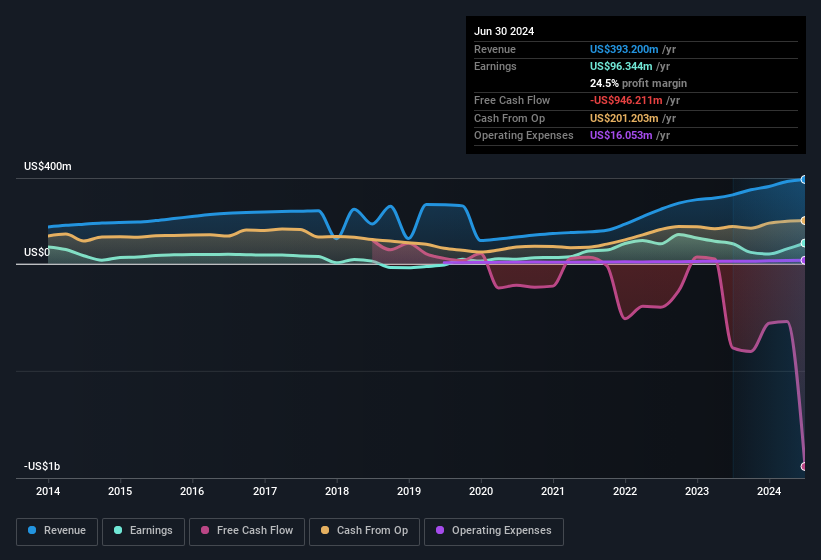- United States
- /
- Marine and Shipping
- /
- NasdaqGS:CCEC
There Are Some Holes In Capital Clean Energy Carriers' (NASDAQ:CCEC) Solid Earnings Release

Following the release of a positive earnings report recently, Capital Clean Energy Carriers Corp.'s (NASDAQ:CCEC) stock performed well. Investors should be cautious however, as there some causes of concern deeper in the numbers.
See our latest analysis for Capital Clean Energy Carriers

Examining Cashflow Against Capital Clean Energy Carriers' Earnings
One key financial ratio used to measure how well a company converts its profit to free cash flow (FCF) is the accrual ratio. In plain english, this ratio subtracts FCF from net profit, and divides that number by the company's average operating assets over that period. You could think of the accrual ratio from cashflow as the 'non-FCF profit ratio'.
As a result, a negative accrual ratio is a positive for the company, and a positive accrual ratio is a negative. That is not intended to imply we should worry about a positive accrual ratio, but it's worth noting where the accrual ratio is rather high. That's because some academic studies have suggested that high accruals ratios tend to lead to lower profit or less profit growth.
For the year to June 2024, Capital Clean Energy Carriers had an accrual ratio of 0.59. Statistically speaking, that's a real negative for future earnings. And indeed, during the period the company didn't produce any free cash flow whatsoever. Even though it reported a profit of US$96.3m, a look at free cash flow indicates it actually burnt through US$946m in the last year. We also note that Capital Clean Energy Carriers' free cash flow was actually negative last year as well, so we could understand if shareholders were bothered by its outflow of US$946m. Having said that, there is more to consider. We must also consider the impact of unusual items on statutory profit (and thus the accrual ratio), as well as note the ramifications of the company issuing new shares.
That might leave you wondering what analysts are forecasting in terms of future profitability. Luckily, you can click here to see an interactive graph depicting future profitability, based on their estimates.
To understand the value of a company's earnings growth, it is imperative to consider any dilution of shareholders' interests. As it happens, Capital Clean Energy Carriers issued 193% more new shares over the last year. That means its earnings are split among a greater number of shares. To celebrate net income while ignoring dilution is like rejoicing because you have a single slice of a larger pizza, but ignoring the fact that the pizza is now cut into many more slices. You can see a chart of Capital Clean Energy Carriers' EPS by clicking here.
A Look At The Impact Of Capital Clean Energy Carriers' Dilution On Its Earnings Per Share (EPS)
As you can see above, Capital Clean Energy Carriers has been growing its net income over the last few years, with an annualized gain of 64% over three years. In contrast, earnings per share were actually down by 23% per year, in the exact same period. And in the last year the company managed to bump profit up by 3.4%. But that's starkly different from the 48% drop in earnings per share. Therefore, one can observe that the dilution is having a fairly profound effect on shareholder returns.
If Capital Clean Energy Carriers' EPS can grow over time then that drastically improves the chances of the share price moving in the same direction. But on the other hand, we'd be far less excited to learn profit (but not EPS) was improving. For that reason, you could say that EPS is more important that net income in the long run, assuming the goal is to assess whether a company's share price might grow.
The Impact Of Unusual Items On Profit
Given the accrual ratio, it's not overly surprising that Capital Clean Energy Carriers' profit was boosted by unusual items worth US$28m in the last twelve months. While we like to see profit increases, we tend to be a little more cautious when unusual items have made a big contribution. When we analysed the vast majority of listed companies worldwide, we found that significant unusual items are often not repeated. And that's as you'd expect, given these boosts are described as 'unusual'. Assuming those unusual items don't show up again in the current year, we'd thus expect profit to be weaker next year (in the absence of business growth, that is).
Our Take On Capital Clean Energy Carriers' Profit Performance
Capital Clean Energy Carriers didn't back up its earnings with free cashflow, but this isn't too surprising given profits were inflated by unusual items. Meanwhile, the new shares issued mean that shareholders now own less of the company, unless they tipped in more cash themselves. For all the reasons mentioned above, we think that, at a glance, Capital Clean Energy Carriers' statutory profits could be considered to be low quality, because they are likely to give investors an overly positive impression of the company. In light of this, if you'd like to do more analysis on the company, it's vital to be informed of the risks involved. For instance, we've identified 5 warning signs for Capital Clean Energy Carriers (4 are a bit unpleasant) you should be familiar with.
In this article we've looked at a number of factors that can impair the utility of profit numbers, and we've come away cautious. But there is always more to discover if you are capable of focussing your mind on minutiae. Some people consider a high return on equity to be a good sign of a quality business. While it might take a little research on your behalf, you may find this free collection of companies boasting high return on equity, or this list of stocks with significant insider holdings to be useful.
New: AI Stock Screener & Alerts
Our new AI Stock Screener scans the market every day to uncover opportunities.
• Dividend Powerhouses (3%+ Yield)
• Undervalued Small Caps with Insider Buying
• High growth Tech and AI Companies
Or build your own from over 50 metrics.
Have feedback on this article? Concerned about the content? Get in touch with us directly. Alternatively, email editorial-team (at) simplywallst.com.
This article by Simply Wall St is general in nature. We provide commentary based on historical data and analyst forecasts only using an unbiased methodology and our articles are not intended to be financial advice. It does not constitute a recommendation to buy or sell any stock, and does not take account of your objectives, or your financial situation. We aim to bring you long-term focused analysis driven by fundamental data. Note that our analysis may not factor in the latest price-sensitive company announcements or qualitative material. Simply Wall St has no position in any stocks mentioned.
About NasdaqGS:CCEC
Capital Clean Energy Carriers
A shipping company, provides marine transportation services in Greece.
Moderate with reasonable growth potential.


